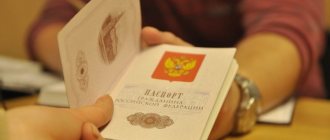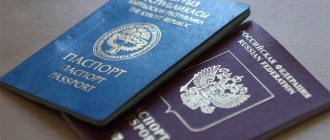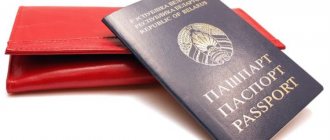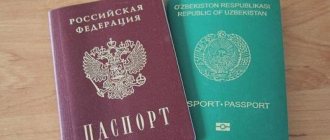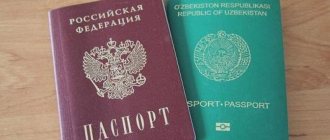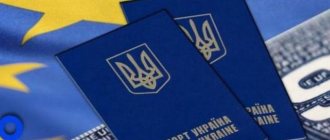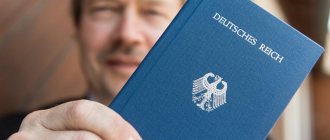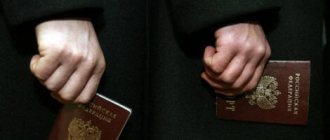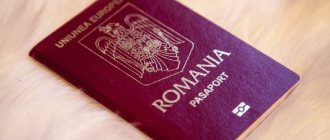For citizens who were born in Russia or have family roots in this country, they can be returned to their homeland. According to the new law, this process can be carried out using a simplified system; it is enough to just write a refusal from a notary about the refusal of Ukrainian citizenship.
Other foreign citizens can still count on obtaining citizenship without giving up what they already have, but this opportunity is only available to specific countries with which Russia maintains relations.
The concept of dual citizenship
Attitudes towards dual citizenship, which predetermine the essence of the state's legal policy in the field of citizenship, vary depending on the characteristics of politics, culture, demographic, ethnographic situation, geographical location and other factors.
Important!!! Dual citizenship should be understood as a special political and legal state of an individual, in which he simultaneously possesses the citizenship of two or more foreign states .
The Russian Citizenship Law of 2002 defines dual citizenship as a citizen of the Russian Federation having citizenship (nationality) of a foreign state.
Dual citizenship complicates the legal position of a person who simultaneously has citizenship of two or more states, since his stable legal connection with two states gives rise to not only “double rights”, but also “double responsibilities”.
How does the Russian Federation treat dual citizenship?
According to Article 6 of the Law “On Citizenship of the Russian Federation” dated May 31, 2002 No. 62-FZ, “a citizen of the Russian Federation who also has another citizenship is considered by the Russian Federation only as a citizen of the Russian Federation, except for cases provided for by an international treaty of the Russian Federation or federal law " Russia does not have such an agreement with Moldova, therefore dual citizenship in Russia and Moldova is completely excluded.
This is echoed by Article 62 of the Constitution of the Russian Federation: “A citizen of the Russian Federation may have citizenship of a foreign state (dual citizenship) in accordance with federal law or an international treaty of the Russian Federation.”
Consequently, the basic law of the country clearly and clearly states that this type of citizenship is permitted in Russia and any statements about its prohibition are erroneous. Moreover, just below in the same article it is directly stated that the presence of a citizen of the Russian Federation with a passport of a foreign state does not detract from his constitutional rights and freedoms and does not relieve him of the obligations arising from citizenship of the Russian Federation, except in cases where Russian legislation provides otherwise.
Thus, the case of a Russian having several passports is provided for in the Constitution and is not a violation.
Since 2014, Russian citizens who have received a foreign passport are required to inform the authorities of the Main Directorate for Migration Issues (GUVM) of the Ministry of Internal Affairs of the Russian Federation about this.
Violation of this rule carries serious liability, including criminal liability.
Such persons cannot hold high positions in government bodies, serve in law enforcement agencies, or hold high positions in the media or be the owner of a significant part in such media.
Who can have dual citizenship in the Russian Federation
Russia has an interstate agreement regulating issues of dual citizenship only with the Republic of Tajikistan.
Until 2003, a similar agreement existed with the Republic of Turkmenistan, but currently it is not in force.
Thus, the presence of a Russian citizen with a passport of any other state, except for the passports of the Russian Federation and the Republic of Tajikistan, is not a fact of dual citizenship in Russia.
Obligation of citizens of the Russian Federation to notify the GUVM authorities about foreign citizenship
Since 2014, according to amendments to the Federal Law “On Citizenship of the Russian Federation”, Russians have been required to report whether they have the right to live in a foreign country or have received a foreign passport.
Notification is given two months from the moment the acquisition of documents (passport, permanent residence permit) was completed; for persons who permanently reside abroad, a one-month period is established to submit an application of the appropriate content upon returning to Russia.
Submission of notification of the presence of another citizenship or residence permit in a foreign state by a citizen of the Russian Federation is carried out in person or by mail through Russian Post.
Responsibility for violation of notification deadlines
In accordance with Article 19.8.3 of the Code of Administrative Offences, for violation of the procedure for submitting a notification about a Russian citizen having citizenship or a document confirming the right to permanent residence in a foreign state, which is expressed in the untimely submission of such a notification or the provision of false or incomplete information, administrative penalties are provided a fine of 500 to 1000 rubles.
Failure to fulfill the obligation to submit a notification of the presence of a foreign passport or permanent residence permit, in accordance with Article 330.2 of the Criminal Code of the Russian Federation, entails the imposition of penalties on the guilty person (up to 200 thousand rubles or in the amount of the annual salary) or the assignment of compulsory work for a period of up to 400 hours.
Who can have multiple passports in the Republic of Moldova
In the Republic of Moldova, dual citizenship is allowed with any country. Any citizen can have an unlimited number of passports from other states and this will not affect his rights in any way.
In December 2007, Moldova restricted the right to own other passports for civil servants, but this ban did not last long: already on December 23, 2009, this restriction was lifted.
The legislation of the Republic of Moldova treats dual citizenship with Russia quite legally, and EU laws allow you to enter the countries of the European Union without a visa if you have a Moldovan passport. The latter is quite interesting for Russian citizens, especially those who are descendants of residents of the republic and have the right to obtain citizenship through a simplified procedure.
Is there dual citizenship in Moldova?
If there is a need to fill out papers for restoration or acquisition of citizenship, or for renunciation of Moldovan citizenship, then it is best to contact the multifunctional center emigrare.md
World globalization has led to the fact that people want to have passports from several countries. Let's consider whether dual citizenship is possible in Moldova.
Is there dual citizenship in Moldova?
Legislation of Moldova
The Republic of Moldova does not have any officially concluded agreements with other countries on dual citizenship. However, the attitude towards persons with second and multiple citizenship is extremely liberal. Any citizen of Moldova can have an unlimited number of passports from other countries; There are no restrictions in this regard even for civil servants.
Since dual citizenship itself is not prohibited in Moldova, you can apply for a Moldovan passport if you meet the necessary requirements. But this will be the second citizenship.
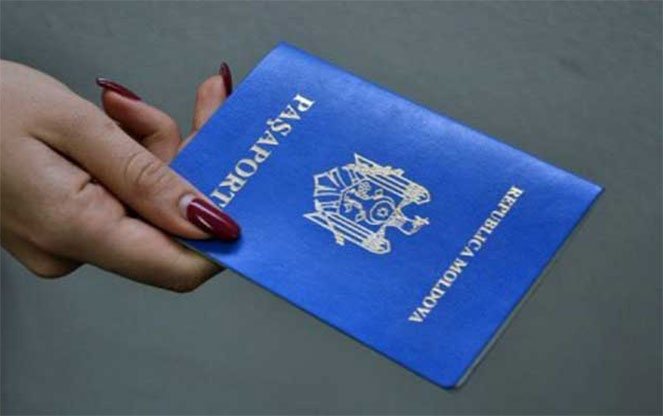
At the constitutional level, citizens of the Russian Federation have the right to obtain second and subsequent citizenships of other states.
Attitude and legislative aspects of Moldova towards multiple indigeneity
Although Moldova does not legally allow or prohibit dual citizenship for foreigners, the country has liberal laws regarding obtaining a local passport. The document can be applied for by persons who had relatives in the state, previously renounced their citizenship, or decided to marry a local resident. Although the laws do not describe the rules of multiple indigenous people, there is a loyal attitude towards such a phenomenon. The main thing is to have compelling reasons for obtaining a passport.
Although the laws do not describe the rules of multiple indigenous people, there is a loyal attitude towards such a phenomenon.
What is the difference between dual and second citizenship?
Many people believe that owning two passports automatically makes a person a dual citizen. But from a legal point of view this is not at all true.
Dual citizenship can only be obtained if an international treaty on mutual recognition of citizenship has been signed between both states. In the absence of such an agreement between countries, you can also have multiple passports, but your status is completely different - you are considered a person who has a second (or multiple) citizenship. In this case, you are subject to the jurisdiction only of the country in which you are currently located, and having a second passport on its territory has no legal status.
Practical advice. Before applying for a visa or buying tickets to another country, we recommend checking whether there is a ban on leaving the country. You can do this quickly, safely and online using the proven service Nevylet.rf
If you are outside both countries in which you have citizenship, you can use an ID card from either country to identify yourself.
In the absence of such an agreement between countries, you can also have multiple passports, but your status is completely different; you are considered a person who has a second or multiple citizenship.
Prospects for dual citizenship between Moldova and Russia
The Government of the Republic of Moldova has repeatedly taken the initiative to formalize an agreement on dual citizenship between Moldova and Russia. At present, the Russian side has not given any specific response to this proposal, but has promised to study this issue and make a mutually beneficial decision on it.
This means that if the agreement is nevertheless signed, Moldovan citizens will not be able to renounce their citizenship due to their receipt of Russian passports.
How to renounce citizenship of the republic
Life is so unpredictable that at some point, on the contrary, you may need to leave for permanent residence in another country. Renunciation of Moldovan citizenship is carried out on the basis of the following documents:
- application in the prescribed form;
- autobiography;
- passport of the state to which the person went for permanent residence;
- photos;
- receipt of payment of state duty.
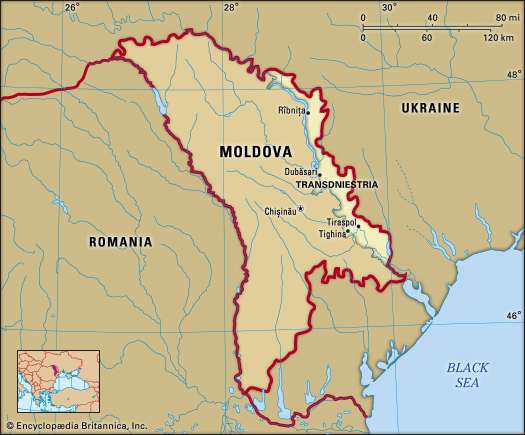
Notification to the GUVM authorities about foreign citizenship
Since 2014, according to amendments to the Federal Law “On Citizenship of the Russian Federation”, Russians must report whether they have the right to reside in another country or have a foreign passport.
| Notice deadline | Under what conditions |
| Two month | The notification must be submitted within two months from the date of receipt of the document: passport or permanent residence permit. |
| One month | Persons who permanently reside in the territory of another state. They are given a month's time after returning to Russian territory. |
There are several ways to notify the GUVM authorities about the right of residence in another state:
- Personal visit to the GUVM authorities;
- Send notification by mail via Russian Post.
Repatriation
This procedure involves the return to homeland of a person who previously lived in the territory of the state (or his ancestors). You may fall under this procedure in the following cases:
- have confirmation that the applicant was born on the territory of the state;
- have blood ancestors who are (were) indigenous inhabitants of the republic;
- have family ties with residents of Herts district, Bessarabia, northern Bukovina, who lived in these territories until 1940;
- have relatives who migrated from the above territories after 1940.
Responsibility for violation of notification deadlines
In accordance with Article 19.8.3 of the Code of Administrative Offences, for violation of the procedure for submitting a notification about a Russian citizen having citizenship or a document confirming the right to permanent residence in a foreign state, which is expressed in the untimely submission of such a notification or the provision of false or incomplete information, administrative penalties are provided a fine of 500 to 1000 rubles.
For failure to fulfill obligations to submit a notification of the presence of a passport of another state or a document on the basis of which one can reside in the territory of another country, in accordance with Article 330.2 of the Criminal Code of the Russian Federation, a fine in the amount of 200,000 rubles or in the amount of an annual salary may be imposed on the guilty person , or assign compulsory work for up to 400 hours.
Who is eligible for dual citizenship?
Moldova has liberal laws for obtaining citizenship by residents of the Russian Federation. A wide range of people have the right to a second passport:
- born in the country or parents from the republic;
- relatives are native Moldovans;
- a person married to a local resident for more than 3 years;
- parents who adopted a local child;
- those who have renounced citizenship or wish to undergo naturalization.
In the case of naturalization, marriage with a Moldovan or residence, moving to Moldova for permanent residence for a period of 10 years is required.
